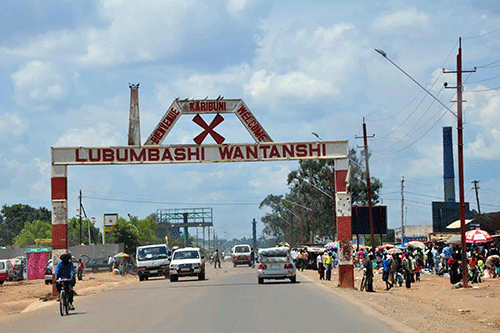As the implementation of the African Free Trade Agreement gains traction, Namibian businesses have been encouraged to expedite the exploitation of the potentially massive market of the Democratic Republic of Congo (DRC) which has a population of about 130 million people.
That country’s ambassador to Namibia, Anastas Kaboba Kasongo Wa Kimba, has specifically called on businesses from both countries to strongly consider the establishment of joint production or manufacturing facilities, particularly in the sphere of agro-processing.
Speaking to New Era this week, the ambassador confirmed Namibia’s trade ministry’s intentions to develop trade and industrial estates on land donated to Namibia by the DRC. In fact, Wa Kimba revealed the DRC actually donated two tracts of land to Namibia, namely in Lubumbashi, Haut-Katanga province, along the Walvis Bay-Ndola-Lubumbashi Corridor, as well as in Matadi harbour and capital city, in Kongo Central, which is DRC’s coastal province on the Atlantic Ocean.
In this regard and due to funding and logistics, Namibian officials decided to prioritise first the development of the Lubumbashi site to promote and trade in Namibian goods and services with the southern side of the DRC. “This is an advantage for Namibians because it is like Namibia will be expanding its territory into one of the biggest markets, the DRC. This presents a real opportunity to stimulate growth, reduce poverty and expand economic inclusion and for job creation on both sides,” said Wa Kimba. The ambassador explained the anticipated development will eventually include wet and dry warehouses, financial services, fuel depots, a petrol station, immigration and tax offices as well as ample accommodation and space for relaxation and entertainment.
Namibia currently exports products such as salt, fish, beef and mining chemicals to the DRC. In turn, some of that country’s main exports include a wide range of rare and valuable minerals, including oil, as well as timber and a host of agricultural products.
“The DRC government is really pushing to make the African Free Trade Agreement a reality. The DRC has a multitude of agri-products that can be exported to Namibia and we need to really promote business relationships between the two countries,” said Wa Kimba. The DRC ambassador also hailed Namibia’s President Hage Geingob as the visionary who initiated (as then trade minister) the establishment of a Namibian business estate in the DRC. Wa Kimba added that the establishment of a permanent home for Namibia businesses in the DRC can only strengthen the bilateral relationship between the two countries. “I encourage Namibian businesses to consider as many products as possible for the growing DRC market, as we need to reinforce and accelerate business ties between the two countries,” said Wa Kemba.
According to the trade and industrialisation ministry, the groundwork has been laid for the establishment of Namibia’s trade and industrial estates in the DRC. Earlier this week, trade ministry spokesperson Elijah Mukubonda stated that next on the schedule for the Lubumbashi estate site is the clearing of land, construction, connection of water and electricity utilities, and general maintenance.
“The estates will be used as hubs for the promotion and trading of Namibian goods and services in these markets and further into West and Central Africa, such as meat and meat products, fish and fish products, beer and beverages, dairy products, cereals and other agro and industrial products,” said Mukubonda.
The trade ministry, in conjunction with relevant agencies, has been mandated to explore and implement mechanisms to promote and facilitate the exportation of Namibian meat and meat products to Angola and the DRC.
In total, the DRC has donated over 33 hectares of land to Namibia, of which title deeds were officially handed over to the Namibian government. The land is situated in Shinga village in the Kipushi District, Katanga Province, 26km from Lubumbashi and 68km from the borders between the DRC and the Republic of Zambia, along the Kasumbalesa Road.
Mukubonda noted that the construction of cold and dry facilities in the DRC aims to provide a safe and enabling environment for Namibian businesses and service providers alike in creating a type of ‘one-stop-shop’ between Namibia and its counterparts in the rest of Africa. The Namibian trade and industrial estates in the DRC also aims to encourage market diversification and enhancement of trade with the rest of Africa. In addition, the developments intend to stimulate employment and economic growth and through this, ultimately improve government revenue. The intention is also to assist communal farmers, particularly north of the so called ‘redline’ to gain market access for their meat.
The African Continental Free Trade Area (AfCFTA) presents a major opportunity for African countries to bring 30 million people out of extreme poverty and to raise the incomes of 68 million others who live on less than US$5.50 per day.
Through the implementation of the AfCFTA, trade facilitation measures cut red tape and simplify customs procedures. Implementing the AfCFTA is also anticipated to result in necessary reforms to enhance long-term growth in African countries.
The AfCFTA agreement has created the largest free trade area in the world, measured by the number of countries participating. The pact connects 1.3 billion people across 55 countries with a combined GDP valued at US$3.4 trillion.


